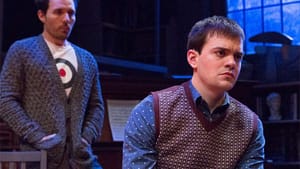Stay in the Loop
BSR publishes on a weekly schedule, with an email newsletter every Wednesday and Thursday morning. There’s no paywall, and subscribing is always free.
Empathy for the deaf
Nina Raine’s ‘Tribes’ by PTC (2nd review)

Tribes is essentially three plays in one. First, as its title suggests, it’s a drama about family loyalties and group identities. The members of the family at the heart of the drama are all highly intelligent, highly articulate, loud-mouthed intellectuals who curse and shout and assume the world is like them, so much so that they ignore some major problems in their midst, like a brilliant son with a stammer and another who can’t hear.
But when Billy, the deaf son (Tad Cooley), meets Sylvia, a girl who introduces him to the deaf world and teaches him how to communicate through signing (Amanda Kearns), he finds he must make choices about where his loyalties lie — just as Sylvia, dealing with her own loss of hearing, struggles to decide whether to be part of the hearing or deaf communities.
Tribes also concerns communication: how we listen or don’t listen to each other. Nina Raine’s dialogue hits us over the head with ideas about communication while the walls of the living room are covered with books and art — traditional forms of communication.
Voices in his head
The parents of this tribe are both fully immersed in the world of words. Christopher (John Judd) is a university professor of criticism (whatever that might mean), and Beth (Laurie Klatscher) is trying to write a novel. Billy’s brother Daniel (Alex Hoeffler) is writing his thesis on linguistics while trying to fend off the voices in his head, and sister Ruth (Robin Abramson) sings opera in pubs — perhaps the ultimate challenge in communicating with an audience that really doesn’t want to hear what you’re saying. Everyone talks about communication, just in case we missed the point. They ignore the deaf boy in their midst as he struggles to keep up by lip reading, until Billy ultimately refuses to speak their language any more.
The play’s most powerful moment occurs in the second act, when Billy literally stops communicating with his family until they learn to speak his language. Instead he lets his new love, Sylvia, speak for him.
The third story — the story that isn’t really being told — is the story of deafness, of what it means to be deaf in a hearing world: how one fits in or doesn’t, how one identifies with the community, and the divisions within the deaf community itself.
A rare subject
Billy’s story gets derailed a bit by his seeming lack of a strong moral core — not too surprising, given his upbringing — but it undercuts what could really be the story with the most potential. During the post-curtain talkback, an audience member noted that this production is written, directed, and acted by members of the hearing world. It couldn’t be otherwise. Other than Cooley, an actor who is losing his hearing in real life and dealing with some of the same decisions confronting the characters in the play, everyone else on stage is hearing. They know about deafness, but they don’t know deafness.
(The same could be said about me: Although I’ve taught deaf students for almost 20 years, I’m not deaf and consequently I’m not part of that world.)
Playwright Nina Raine says Tribes was inspired by a documentary about the education of a deaf boy. She researched the issues facing the deaf community, and for the most part she did a good job. Tribes addresses issues rarely confronted in mainstream theater. In searching for other plays with deaf actors dealing with issues of deafness, the only ones I could think of are Children of a Lesser God, The Miracle Worker, and Act Normal. On TV there is the series Switched at Birth, and apparently No Ordinary Hero: The SuperDeafy Movie has a deaf superhero. Nor are there, to my knowledge, any deaf playwrights writing about deafness issues for the hearing world.
The issue of lip reading vs. signing is still alive in the deaf community, as are questions about mainstreaming deaf children vs. sending them to special schools. And now there is also the question of whether or not to have surgery for cochlear implants.
Ultimately the relationship between the young hearing-impaired sweethearts Billy and Sylvia is what holds this play together. And Tribes itself can play an important part of the discussion about how to make sure the deaf can be heard — whether by the hearing community or each other.
To read another review by Dan Rottenberg, click here.
To read another review by Steve Cohen, click here.
What, When, Where
Tribes. By Nina Raine; Stuart Carden directed. Through February 23, 2014 at Philadelphia Theatre Company at the Suzanne Roberts Theatre, 480 S Broad St., Philadelphia. 215-985-0420 or www.philadelphiatheatrecompany.org.
Sign up for our newsletter
All of the week's new articles, all in one place. Sign up for the free weekly BSR newsletters, and don't miss a conversation.

 Naomi Orwin
Naomi Orwin